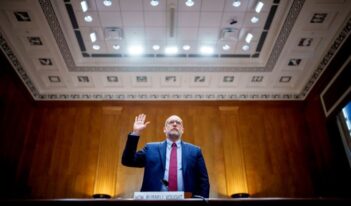
The federal government shuts down, the Supreme Court lets Federal Reserve board member continue serving, and more…
IN THE NEWS
- Congress failed to approve government funding legislation by its October 1 deadline, resulting in a shutdown. During this funding lapse, mandatory spending such as social security benefits and postal services will continue, and “essential” federal employees will remain at work unpaid but entitled to later backpay, while other employees are furloughed, or placed on a temporary, unpaid leave. The U.S. Congressional Budget Office reported that about 750,000 employees could be furloughed, although Office of Management and Budget Director Russ Vought reportedly suggested that the Administration would permanently fire some federal employees in lieu of furloughs. Vought previously directed federal agencies to identify programs “not consistent with the President’s priorities” and prepare plans for permanent firings in the event of a shutdown.
- The U.S. Supreme Court deferred the Trump Administration’s request to immediately remove Lisa Cook from her position as member of the Board of Governors of the Federal Reserve System. The Court’s order allows Cook to participate in upcoming Federal Reserve meetings and delays any change in control of its board. The Court set oral arguments for January 2026 to consider whether President Donald J. Trump may fire Cook for alleged mortgage fraud before she joined the Federal Reserve. Lower courts have blocked President Trump’s firing attempt, finding that his allegations likely do not satisfy the law’s “for cause” requirement that there be evidence of wrongdoing to justify a dismissal.
- The Trump Administration announced a coordinated plan between several agencies to open 13.1 million acres of federal lands for coal mining and provide $625 million to upgrade or recommission coal plants around the country. The U.S. Department of the Interior will open the federal lands and lower the rates companies must pay to extract coal. The U.S Department of Energy will provide the grants to extend the lifespan of existing coal plants and improve electricity reliability. The U.S. Environmental Protection Agency will delay deadlines for coal-fired power plants to comply with wastewater pollution limits. This coordinated plan follows an executive order issued by President Trump earlier this year aimed at boosting the coal industry.
- The Trump Administration announced a deal with Pfizer to sell its drugs directly to consumers at discounted prices through a new federal website, TrumpRx.gov, set to launch in 2026. Under the agreement, Pfizer pledged to match prices for new drugs in the United States to those in other developed countries and extend similar price-matching terms to Medicaid. Experts cautioned, however, that savings may be limited because discounts apply only to uninsured patients and are based on high list prices. In return for the deal, the Trump Administration granted Pfizer a three-year exemption from proposed tariffs.
- The U.S. Department of Health and Human Services (HHS) recommended barring Harvard University from receiving federal funding or entering into contracts with the federal government. HHS’s Office for Civil Rights previously claimed that Harvard had acted with “deliberate indifference” toward discrimination against Jewish and Israeli students. HHS began formal administrative proceedings to decide if Harvard will be deemed ineligible for federal funds and stated that the university has 20 days to notify the agency if it will exercise its right to a hearing. Suspension and exclusion from funding and contracts apply across all agencies.
- The state of Oregon and city of Portland sued to stop President Trump from deploying National Guard troops to Portland, an action the President characterized as protecting the city, and particularly U.S. Immigration and Customs Enforcement facilities, from “domestic terrorists.” The lawsuit accuses the President of federalizing the Oregon National Guard for the illegal purpose of civilian law enforcement and of trampling constitutional principles by singling out “politically disfavored jurisdictions” for retribution. U.S. Attorney General Pam Bondi defended the deployment in a memo directing U.S. Attorneys in the District of Oregon to prosecute “every person suspected of threatening or assaulting a federal law enforcement officer” to the greatest extent possible.
- The U.S. Food and Drug Administration approved a new generic version of the abortion pill, clearing a drug manufacturer to sell tablets of mifepristone that are equivalent to the long-available drug Mifeprex. The move is expected to expand access to medication abortions, which make up about two-thirds of all U.S. abortions. The approval produced sharp criticism from anti-abortion groups and Republican lawmakers, who urged the Trump Administration to reverse policies that allow abortion pills to be distributed by mail.
- A new California law strengthens protections for employee whistleblowers at major AI companies and requires companies to disclose their safety protocols and report critical safety incidents. California Governor Gavin Newsom, who vetoed a stricter AI bill last year, commended the new law in a public letter. Newsom stated that future AI regulation will involve collaboration with the federal government, and the new law allows federal regulations to replace some of its own provisions in certain cases.
- A federal court ruled in favor of Meta, ending a lawsuit that alleged that the company misled Facebook users about its privacy protections. The plaintiffs argued that although Facebook is free to use, they were nonetheless financially harmed by Meta’s misrepresentations because if users had known what data they were providing, Meta would have paid users $5.00 per months in a competitive market to access that data. U.S. District Judge James Donato rejected the plaintiffs’ expert testimony in support of this theory, ending the lawsuit. Meta still faces a Federal Trade Commission lawsuit alleging that the company strategically acquired competitors such as Instagram and WhatsApp to maintain a monopoly on personal social networking.
WHAT WE’RE READING THIS WEEK
- In a National Bureau of Economic Research working paper, Cavit Baran, a professor at Sabancı University, and several coauthors examined the effect of electric vehicle use on air quality and child health. Using county-level data from 2010 to 2021, the Baran team compared electric vehicle registrations to levels of nitrogen dioxide—a harmful pollutant linked to vehicle emissions—and several health measures including low infant birth weights, preterm births, and asthma-related emergency department visits. Baran and his coauthors found that a one-unit increase in electric vehicles per 1,000 vehicles led to significant declines in pollutant levels and reduced negative child health outcomes. They recommended increasing investment in electric vehicle charging infrastructure to encourage adoption of electric vehicles and further improve health.
- In an article in the Yale Journal on Regulation, Raúl Carrillo, an academic fellow at Columbia Law School, examined how financial technology (“fintech”) companies such as Venmo, Cash App, and other “platform money” providers rely on data collection systems that expose consumers to risks they cannot reasonably avoid. He explained that data brokers gather detailed personal and financial information, often without users’ knowledge, and sell it to fintech firms that use it to shape credit decisions, advertising, and financial services. Carrillo argued that this “data maximization” model makes financial services more invasive and less secure, producing harms ranging from privacy violations to identity theft and discrimination. He contended that outdated U.S. financial data laws leave consumers vulnerable and called for stronger rules based on data minimization which would limit the collection and use of personal data.[Sean]: A new Government Accountability Office (GAO) report examined the Office of Science and Technology Policy’s (OSTP) effectiveness at addressing sexual harassment in federally funded research institutions. In 2022, Congress directed OSTP to inventory institutions’ policies, issue guidance for improvement, and ensure compliance by October 3, 2025. The new report, however, found that OSTP-issued guidance left out some elements required by the law, such as requirements for institutions to report launched investigations or for federal agencies to share harassment reports, and that the guidance arrived 20 months behind schedule. GAO found that every included research institution would require policy updates to comply with OSTP guidance, but as of July, OSTP had not hired staff to monitor compliance as required by law, suggesting it may miss the October deadline.
EDITOR’S CHOICE
- In an essay in The Regulatory Review, Mark Nevitt, an associate professor of law at Emory University School of Law, argued that use of gas-powered leaf blowers should be banned. Nevitt described the negative environmental effects of these leaf blowers, which are powered by antiquated engine technology. He noted that a half-hour of yard work with a gas-powered leaf blower emits the same amount of air pollution as driving cross-country in a large pickup truck. Nevitt criticized gas-powered leaf blowers for their excessive loudness, which can result in permanent hearing loss. Nevitt suggested combining local bans on gas-powered leaf blowers with tax credits to offset the cost of the transition to electric leaf blowers.



